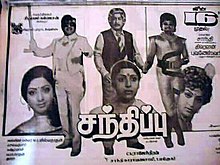Sandhippu
| Sandhippu | |
|---|---|
 Theatrical release poster | |
| Directed by | C. V. Rajendran |
| Screenplay by | Peter Selvakumar |
| Story by | Kader Khan Prayag Raj K.K. Shukla |
| Produced by | Santhi Narayanasamy |
| Starring | Sivaji Ganesan Radha Sridevi Prabhu |
| Cinematography | G. Or. Nathan |
| Edited by | B. Kandhasamy |
| Music by | M. S. Viswanathan |
Production company | |
Release date |
|
| Country | India |
| Language | Tamil |
Sandhippu (transl. Rendezvous) is a 1983 Indian Tamil-language masala film, directed by C. V. Rajendran and written by Peter Selvakumar. The film stars Sivaji Ganesan, Sridevi, Sujatha, M. N. Nambiar and Prabhu.[1] It is a remake of the 1981 Hindi film Naseeb.[2] The film ran for over 175 days in theatres, becoming a silver jubilee hit.[3]
Plot
[edit]This article needs an improved plot summary. (December 2024) |
Ramanathan, the trustee of the town temple, and Muthayya, the dharmagatha, are highly respected figures in their community. Their families share a close bond.
Rajavelu, who works for Ramanathan, uses his position as a cover to scout the temple and plot to steal its jewellery. With his partner Vedagiri, Rajavelu drugs Ramanathan, murders Muthayya, and robs the temple. When Ramanathan discovers their crime, they threaten his family, forcing him to sign a false confession before brutally assaulting him. The police, convinced of Ramanathan’s guilt, arrest him. Outraged, the townspeople drive Ramanathan’s wife, Lakshmi, and their sons, Raja and Vijay, out of town. The family is separated in the aftermath.
Years later, Raja works as a club waiter and part-time boxer to support Vijay’s college education. Lakshmi, now an adoptive mother, raises Geetha, a singer who performs at the same club as Raja. Vijay falls in love with his classmate Chithra, unaware that she is Muthayya’s daughter. Meanwhile, Raja and Geetha develop feelings for each other, but Prem – Vedagiri’s son and the club’s new co-owner – also pursues Geetha.
Rajavelu and Vedagiri have grown wealthy and now serve a mysterious and powerful criminal known as Don. When Rajavelu visits the club, Raja recognizes him and begins to investigate. His pursuit leads him to Don, who, to Raja’s shock, turns out to be his long-lost father, Ramanathan.
Raja also reconnects with his childhood friend Vasanth, Rajavelu’s son and another co-owner of the club. As the situation grows more complex, Vasanth falls in love with Geetha, further complicating the love triangle.
Now, Raja must unravel the tangled web of relationships, reunite his scattered family, and bring Rajavelu, Vedagiri, and the criminals to justice.
Cast
[edit]- Sivaji Ganesan as Ramanathan and Raja
- Sujatha as Lakshmi
- Prabhu as Vijay
- Sridevi as Geetha
- Radha as Chitra
- Major Sundarrajan as Rajavelu
- M. N. Nambiar as Vedagiri
- Sathyaraj as Dany
- Sarath Babu as Vasanth
- R. N. Sudarshan as Don
- Manorama as Town Saroja
- Vijayakumar as Prem
- Vadivukkarasi as Thangu
- Delhi Ganesh as Muthayya
- Gandhimathi as Warden Philomina
- Vennira Aadai Moorthy as Principal
- Master Haja Sheriff as Saroja Assistant
- Loose Mohan as Writer Mani
Soundtrack
[edit]The music was composed by M. S. Viswanathan, with lyrics by Vaali.[4][5]
| Song | Singers |
|---|---|
| "Raathiri Nilavil" | Vani Jairam |
| "Adi Naan Vangi Vandaenadi" | S. P. Balasubrahmanyam, S. Janaki |
| "Vaarthtai Naanadi Kannamma" | T. M. Soundararajan, Vani Jairam |
| "Ithu Aanandham Vilaiyaadum Veedu" | T. M. Soundararajan, P. Susheela |
| "Sollappur Raja Sollappur Rani" | T. M. Soundararajan, Malaysia Vasudevan, P. Susheela, S. P. Sailaja |
| "Mangalyam Thavazhum" | T. M. Soundararajan |
| "Unnai Than Kumbitten" | T. M. Soundararajan, S. P. Balasubrahmanyam |
Reception
[edit]Jayamanmadhan of Kalki wrote Rajendran makes us feel as we watch the film in fatigue wondering if it is for 18 reels and we are surprised that the film ends too quickly.[6]
References
[edit]- ^ "231-240". nadigarthilagam.com. Archived from the original on 4 March 2016. Retrieved 11 February 2022.
- ^ Nayak, Satyarth (2019). Sridevi: The Eternal Screen Goddess. Penguin Random House. p. 63. ISBN 978-0-670-09267-3.
- ^ Selvaraj, N. (20 March 2017). "வெள்ளி விழா கண்ட தமிழ் திரைப்படங்கள்" [Tamil films that completed silver jubilees]. Thinnai (in Tamil). Archived from the original on 29 March 2017. Retrieved 15 August 2020.
- ^ "Sandhippu". Gaana. Archived from the original on 11 February 2022. Retrieved 11 February 2022.
- ^ "Santhippu Tamil FIlm LP Vinyl Record by MS Viswanathan". Mossymart. Archived from the original on 11 February 2022. Retrieved 11 February 2022.
- ^ ஜெயமன்மதன் (17 July 1983). "சந்திப்பு". Kalki (in Tamil). p. 17. Archived from the original on 16 April 2024. Retrieved 16 April 2024 – via Internet Archive.
